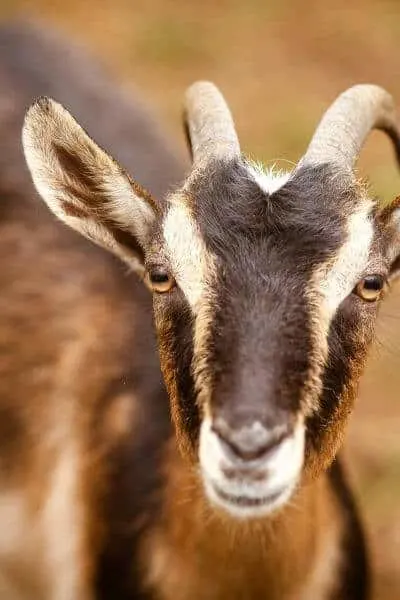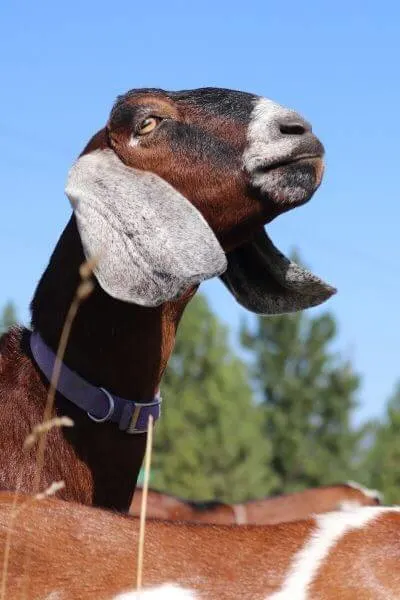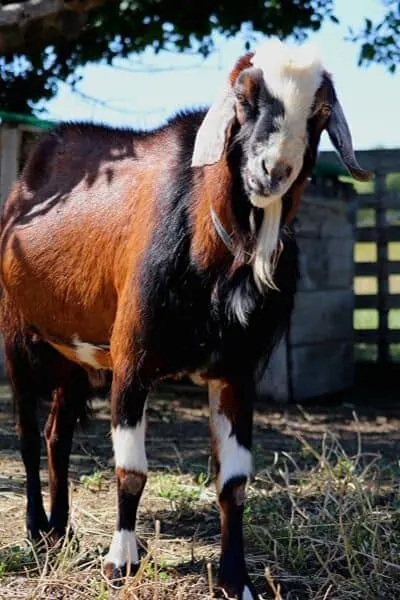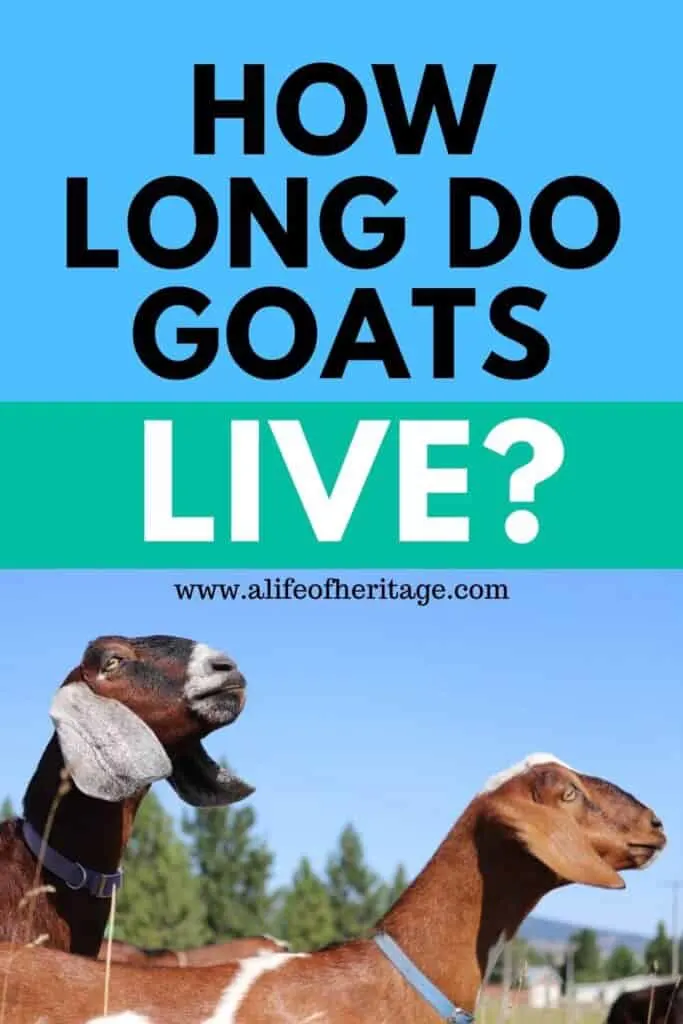My husband glared at my two wethers as he stumbled over them trying to work. “And how long do goats live??” he asked in exasperation.
I grinned. “Good news! They live a looooong time.” Which resulted in a loud and gruff grumble from my other half.
Currently, I have 2 wethers, 7 does, and 1 buck on our property. Which means we have all manner of goats that can live for any number of years.
You see, what a goat does for a living affects the number of years that it lives. Let’s talk about that for a minute.
How Long do Wethers Live?
Wethers, in a way, are the luckiest of goats. Once they have lost their manhood, they go about life eating, drinking and being quite merry! They have no demand put on their bodies in the way of going into rut every year for months on end and they don’t ever have the demand of pregnancy and being in milk.
That is why goats who are wethered can live 15-18 years.
But don’t let that fool you into thinking that these goats won’t get sick or are immune to dying early. Goats are very fragile. If they are not getting the proper nutrition through their minerals they are susceptible to the leading killers like worms and pneumonia in goats.
It is very important to know what goats eat so that they are healthy throughout the entirety of their lives. There are so many issues that can come up without the proper copper levels in a goats diet as well and anemia can take a goat down the sickness path. And a nosey wether who get into the bag of chicken feed can get bloated so easily.
So you see, although a wethered goat CAN live 15-18 years, they may not because of so many complications that can come up. Just know that your goat’s health is your top priority.
How Long do Does Live?
The toll of pregnancy and being in milk really do affect a doe. In many, many cases the loss of life for a doe will be kidding related. Or complications with pregnancy like pregnancy toxemia and ketosis.
But if your doe is taken care of well and you retire her from breeding when she is ten years old, then she can live to be 11-18 years old.
You will do your doe a lot of good knowing the 11 Goat Labor Signs so you can be close and assist her if needed. And taking good care as you milk your goat will also help her stay strong and healthy and produce a lot of milk for you and your family.
It will be of great service to you and your goats to read all the information on this goat resource page: Goat Resource Page
How Long do Bucks Live?
Bucks really do get the short end of the stick. The only reason that we have those cute kids running around is because of our stinky bucks. But going into rut every year is really, really hard on them.
Bucks usually live between 8 and 10 years.
As with your wethers and does, it will be really important to give your bucks the topmost care in their nutrition, supplements, housing and watch them closely as they go through each breeding season so that you can quickly help them if problems arise.
Be sure to have your goat emergency supplies on hand so that you can react to any emergency that comes up.
How Long do Goat’s Live?
So the answer to your question, “how long do goats live?” really varies in the answer depending on the details of your goat and if they are wethered, or used for breeding purposes. So somewhere between 8 and 18 years old if they don’t succumb to some other disease or catastrophe.




Stephen Kepple
Saturday 22nd of January 2022
We run a dairy-goat farm in central Virginia. The information given here is sound, although really it's only a beginning. So is the information that follows. The important thing to know is that goat keeping is quite involved, and not a casual affair. There is a large learning curve. For example, people should know that males cannot be given a protein-rich diet (unlike the does) or they will develop kidney stones and die (very painfully). So, for example, they should not receive alfalfa hay or high-protein goat feed; these are for does only. Fescue hay is fine for the boys. Modest amounts (say, a scoop per male per day) of beet pulp mixed with cracked corn are fine. All goats need access to clean water and horse-quality hay 24/7. The buck yard should be surrounded by a stout 6-foot fence with 6-foot horse gates or a buck may climb over and go mate with the does. Also, if the smells given off by the bucks reach the does too strongly, their milk will taste "goaty" (awful). So the does and the bucks must be separate widely---by at least 50 feet, ideally with the bucks located downwind relative to the prevailing winds. Goats cannot handle wind, cold, rain, or snow without good protection from these elements. Proper barns are essential. The bedding must be kept reasonably clean and dry; we muck out the worst areas every day and cover them with a fresh layer of clean dry straw. Fences should be at least 4 feet high (for does), and preferably 5 feet high, and made of woven wire and posts 8 or 9 feet apart. You will need ample pastures, at least one for the bucks and one for the does. Never keep just a single goat, or it will suffer unbearably from loneliness, and may sicken and even die. You need at least two goats and preferably three. You will need guard dogs or predators will probably kill some of your goats periodically. We have two huge Great Pyrenees (wonderful dogs) for that job. So you also need to know how to raise and keep dogs. The infrastructure for goats is pretty expensive these days, as are supplements and bedding. No one should go into goat keeping casually. These are wonderful, intelligent, affectionate beasts and are well worth the effort and cost for committed, responsible, loving owners. People considering goat keeping should read all they can on the subject and visit farms where goats are kept; many farmers will be glad to show and tell.
Delci Plouffe
Friday 18th of March 2022
I'm so glad you shared all this! Thank you!
I personally have never had a problem with milk tasting "off" from the bucks being across the fence. But I know others have.
Mary
Friday 9th of April 2021
You fail to mention that wethers are more susceptible to urinary calculi if castrated too young. Limiting their diet to just grasses and giving them a mineral supplement can reduce the chances of this problem which can lead to premature death. Otherwise good article.
Delci Plouffe
Saturday 10th of April 2021
Thank you for mentioning that. That is very true and important to think about and work on preventing!